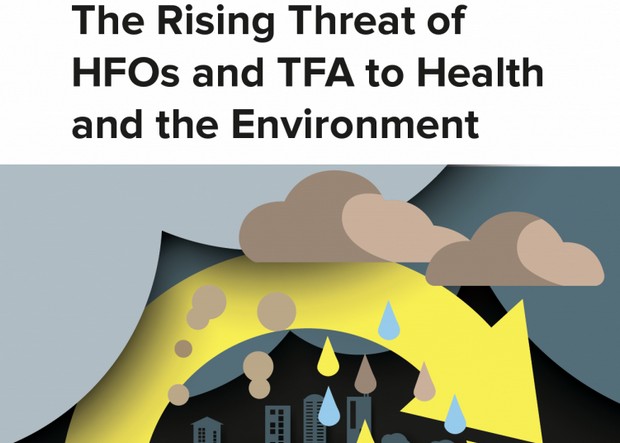ATMOsphere report examines rising threat of HFOs and TFA to health and the environment

ATMOspher has published a new report examining the reported evidence that HFO-1234yf, used widely as a refrigerant by itself and in blends, represents a growing threat to human health and the environment via its atmospheric degradation product, trifluoroacetic acid (TFA).
The report, “The Rising Threat of HFOs and TFA to Health and the Environment,” can be accessed for free here.
The chemical industry’s replacement for HFCs – HFOs (hydrofluoroolefins) – have very low GWP values and thus don’t present a problem for the climate or the ozone layer. But other environmental and health concerns have arisen for HFOs, particularly for HFO-1234yf, a mildly flammable (A2L) refrigerant that is the most widely used HFO, the report notes.
The report cites a myriad of studies have been conducted, mostly in Europe, on the accumulation of HFO-1234yf and TFA in the environment.
When HFO-1234yf leaks into the atmosphere, 100% of it photo-oxidizes, in only 10-14 days, into trifluoroacetic acid (TFA), a short-chain per-fluoroalkylcarboxylic acid (scPFCA). TFA then descends in rainfall to Earth, where, as an extremely durable chemical, it accumulates mostly in water bodies, including rivers, streams, lakes and wetlands.
Even at extremely small concentrations in drinking water, TFA is potentially harmful to human health, says the report, adding that it is difficult to remove from drinking water using conventional methods.
In Germany, where a host of TFA studies have been conducted, the German Environment Agency (UBA) has set a human health “orientation value” limit of 60μg/L for TFA in drinking water and a “precautionary measure” of 10 μg/L. The concentration levels of TFA in the environment have begun to approach – or exceed – those levels in some studies, the report points out.
Long-term exposure to TFA can potentially damage the liver and the thyroid function in humans, according to a report released in 2021 by Refolution Industriekälte, a German consulting and engineering firm focused on sustainable refrigeration.
